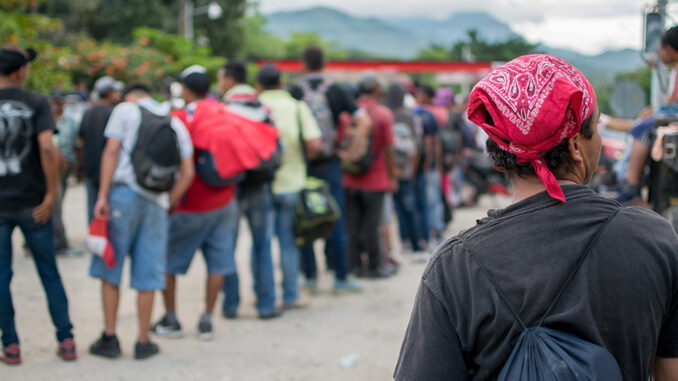
By: Fernando Hermida
An endless line of people snaked inside the facilities of the detention center for undocumented immigrants in the earthy city of Yuma, just on the margins of the Promised Land. A big white tent, where hundreds of military men of arrogant size were walking through the corridors making sure that the whole mechanism of classification was working with perfection. It was the anteroom of a new life to be sprouted and therefore we had to leave behind most of our past. All our belongings had to be placed in a single plastic bag, tiny and sterile. There were too many memories to be saved in such a ridiculous space. Fortunately, we managed to insert a wooden statuette of the Virgen de la Caridad del Cobre, the patron saint of all Cubans, the same deity who had crossed the river and the desert with my family and who was now an immigrant like everyone else.
Later we were offered food and a few minutes of rest. Then we entered a huge hall with hundreds of people who were being interviewed one by one. There were more than five thousand souls waiting to be classified and putting a strain on a mechanism that was operating under a pressure never before experienced. Bored children were running around incessantly; babies were crying disconsolately; people were getting impatient. Finally, the officer mentioned our names: origin, age, ailments. Another officer guided me to see the doctor so he could prescribe my hypertension medication. I left my wife and children on a bench in that room and was taken to the infirmary. I did not say goodbye. I did not see them again for the next four days.
From the infirmary, I was led by another officer down a long corridor to a huge, windowless room divided into rooms separated by clear plastic walls. Inside, hundreds of men from all over the world were crowded together, dozing on thin mattresses, on the floor or on benches, covered by thin metal mylar blankets that comforted the intense cold and painted the human landscape of that tragedy.
But without a doubt, family separation was my greatest anguish. Not knowing the whereabouts of my wife and children and ignoring the conditions in which they were living was the only thing I could not forgive my hosts. Then I discovered that we were all in the same situation there: Joao, a Brazilian truck driver from Mato Grosso and Alex, a Colombian parish priest from Bogota suddenly became my only family. They also missed their own, they cried for them. Two days later, the authorities explained the rules of my upcoming release: I would carry with me a GPS-enabled cell phone that would monitor my location in the country and with which I would have to send a selfie every Thursday from free soil. Rumors among the undocumented immigrants assured that after that procedure, my hours there would be counted; others said that we would finally be allowed to bathe before being released; the most skeptical, however, predicted that the wait could take several weeks…
A voice urged us all to line up for dinner: a meat and vegetable burrito, an apple and a juice. My kids hate burritos, I thought to myself in sorrow. What would they be eating? Where would they be sleeping?
Finally, after four long days, my name was mentioned along with those of other comrades and we knew immediately that this was the sign of liberation. They led a group of us in a line down the white corridors and stopped us in front of another facility inhabited by women and children. At last I could see my family! They were brought into the line right behind me. I saw them crying. They had grown thinner. We were prevented from any show of affection at that moment. I only managed to hold my little girl’s hand tightly but hardly looked at her. We walked to an even larger room and when we arrived we burst into tears. We kissed and hugged each other tightly. The departure was approaching. Some vaccinations, more instructions… The sun was already peeking over the Arizona desert and it was then that we could see, after several days, together, its light on the sand.
